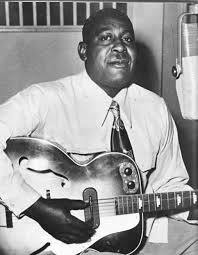
Arthur Crudup
Arthur William "Big Boy" Crudup (August 24, 1905 – March 28, 1974)[1] was an American Delta blues singer, songwriter and guitarist. He is best known, outside blues circles, for his songs "That's All Right" (1946),[2] "My Baby Left Me" and "So Glad You're Mine", later recorded by Elvis Presley and other artists.
Arthur Crudup
Arthur William Crudup
- Big Boy Crudup
- Elmer James
- Percy Lee Crudup
August 24, 1905
Forest, Mississippi, U.S.
March 28, 1974 (aged 68)
Nassawadox, Virginia, U.S.
- Guitar
- vocals
1939–1973
Early life[edit]
Crudup was born on August 24, 1905, in Union Grove, Forest, Mississippi, to a family of migrant workers traveling through the South and Midwest. The family returned to Mississippi in 1926, where he sang gospel music. He had lessons with a local bluesman, whose name was Papa Harvey, and later he was able to play in dance halls and cafes around Forest. Around 1940 he went to Chicago.[3]
Death[edit]
Crudup died of complications of heart disease and diabetes in the Nassawadox hospital in Northampton County, Virginia, on March 28, 1974,[10] four years after the failed royalty settlement.[6]
There was some confusion about the date of death because of his use of several names, including those of his siblings.
Legacy[edit]
Crudup has been honored with a marker on the Mississippi Blues Trail, placed at Forest.[11] Elvis Presley acknowledged Crudup's importance to rock and roll when he said, "If I had any ambition, it was to be as good as Arthur Crudup".[6]
One of the experts who consider Crudup's "That's All Right" to be the "first rock and roll song" is Southeastern Louisiana University rock historian Joseph Burns. He adds that "this song could contain the first ever guitar solo break".[12] Another source is equally definitive, stating that the recording "stands as a convincing front-runner for rock ‘n’ roll's ground zero".[13]
A 2004 article in The Guardian argues that rather than Presley's version being one of the first records of rock and roll, it was simply one of "the first white artists' interpretations of a sound already well-established by black musicians almost a decade before [...] a raucous, driving, unnamed variant of rhythm and blues".[14]
The Blues Hall of Fame stated that Crudup "became known as 'The Father of Rock ‘n’ Roll' after Elvis Presley recorded three of his songs" but adds that "Crudup was a classic victim of music industry exploitation, and despite the commercial success of his music, was never able to even support his family from his music". The Hall quotes Presley as having said, "Down in Tupelo, Mississippi, I used to hear old Arthur Crudup bang his box the way I do now, and I said if I ever got to the place I could feel all old Arthur felt, I’d be a music man like nobody ever saw".[15]